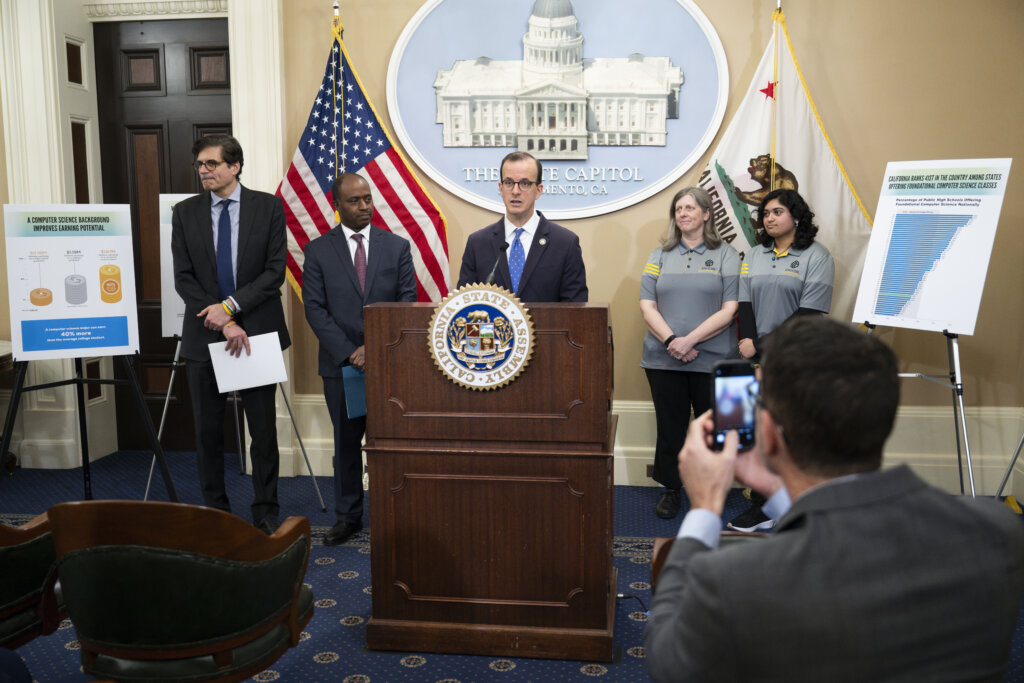
• There’s a significant disparity between the avilability of tech jobs in California and the number of young people completing computer science education.
• Bills are in progres to make computer science education mandatory to graduation.
• BUt how much will htat actually shift the dial or solve the problem?
Home of Silicon Valley and a technology school with just 4% acceptance rates, California is a hive for computer science. Nearly 1.5 million people in the state work tech jobs and its tech workforce is the largest among all the states by a wide margin.
While California’s tech industry delivers an economic impact of $536 billion and there are an estimated 55,868 tech business establishments in the state, education for the younger generation doesn’t reflect the reputation to which the state is entitled.
Just five percent of the 1,930,000 high school pupils in California are enrolled in a computer science course. In fact, despite being a step ahead in technology employment rates, California lags behind the national average, and behind 40 other states, in the percentage of high schools offering computer science education.

One Slashdot user noted that the imagery used in the announcement was “verbatim” lifted from Code.org.
To remedy this, at the beginning of 2023 legislation was introduced by Assemblymember Marc Berman to guarantee access for all high school students in California. Far from being the Silicon Valley state’s step above the rest of the country, AB 1054 aligned California with 27 other states that already required public high schools to offer a computer science education.
Furthering efforts on February 6 this year, at a press conference Berman was joined by State Superintendent of Public Instruction, Tony Thurmond, to unveil a bill that, if passed, would require every public high school to teach computer science.
By the 2030-31 school year, the legislation (AB 2097) proposes, computer science would be established as a requirement for high school graduation.
“It is critical to equip our students with the skills they need to enter the 21st century workforce and succeed in our digitally driven world,” said Berman.
“We owe it to our students to teach them the fundamental skills they need to succeed in tomorrow’s economy – and that starts with having access to a computer science education.”
As of January 2023, California has 45,245 open computing jobs that have an average salary of $153,544, yet there were only 9,339 graduates in computer science in 2020. Indeed, California has the highest number of open computing jobs in the country.
“Too many students who grow up in the shadows of global tech companies are not gaining the skills they need to one day work at those companies,” said Berman. “Not only will AB 2097 help provide the workforce needed for California to remain competitive with other states and other nations, but it is also crucial in closing the existing gender and diversity gaps.”
READ NEXT

Does AI have a place in schools?
“If we truly value equity in our schools, we need to ensure all students have access to computer science education.”
Although female students make up 49% of the school population in California, only 30% of computer science students are female. Does making it a required topic of study open the door to more girls?
Sure, if it’s alongside the right messaging – the fact that computer science doesn’t just set students up for careers in Silicon Valley or tech more broadly, but rather a life that will inevitably be more dominated by technology than it’s ever been before.
It’s true that only 34% of high schools that serve high proportions of Black, Indigenous, Latinx, and Pacific Islander pupils offer computer science courses, compared to 52% of schools serving a greater proportion of White and Asian pupils.
Again, though, simply enforcing that students can’t graduate without passing computer science won’t change much more than metrics. Yes, 100% of those schools will offer computer science education, but who will make sure that students have the resources outside of school to successfully engage in the lessons?
How much algebra do you remember from high school?
The announcement of the Bill comes less than two weeks after the CEO of nonprofit Code.org, Hadi Partovi, was a keynote speaker at the Association of California School Administrators Superintendents’ Symposium.

Co-founder and CEO Hadi Partovi at the Code.org 10th Anniversary Gala.
Code.org has backing from several tech giants and advocates for computer science education. Partovi’s goal is to make computer science a high school graduation requirement in all 50 states by 2030 – so California’s proposed bill is a good start.
Back in an October Facebook post, Berman noted he’d partnered with Code.org on legislation in the past and hinted that something big was in the works on the K-12 CS education front for California.
“I had the chance to attend Code.org’s 10th anniversary celebration and chat with their founder, Hadi Partovi, as well as CS advocate Aloe Blacc. They’ve done amazing work expanding access to computer science education… and I’ve been proud to partner with them on legislation to do that in CA. More to come!”
More did come, and no doubt this is just the beginning. What remains to be seen is whether enforcing computer science education will be enough to shift the public attitude – tech companies might be feeling some hostility in California at the moment.
Waymo certainly isn’t welcome in San Francisco!
happening NOW in SF. Waymo car vandalized & lit on fire 🤯@sfchronicle pic.twitter.com/OEZYFiy6mv
— Michael Vandi (@michael_vandi) February 11, 2024








